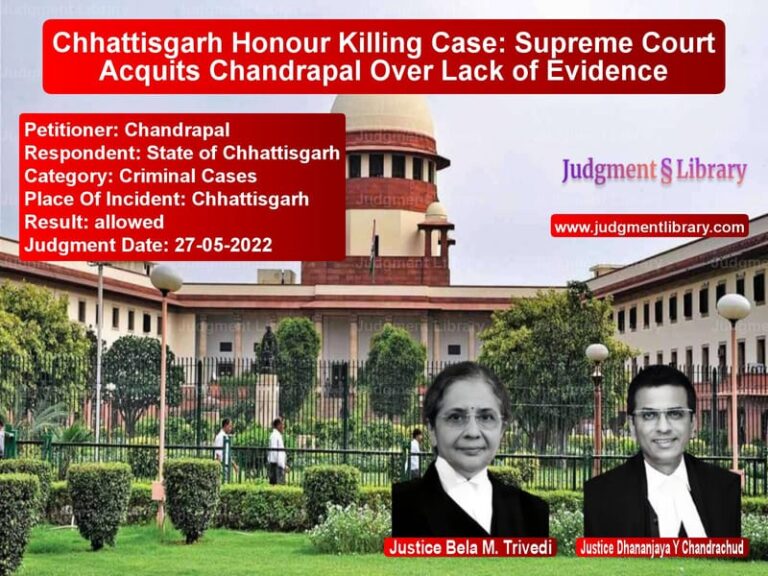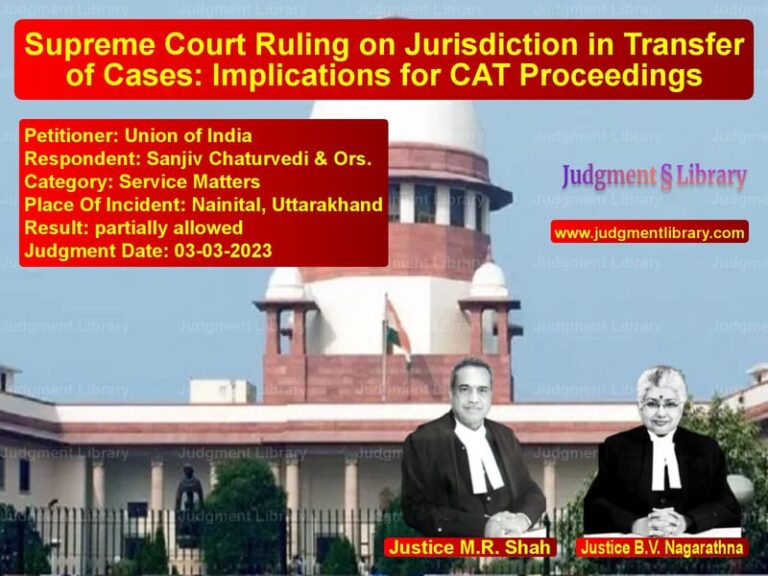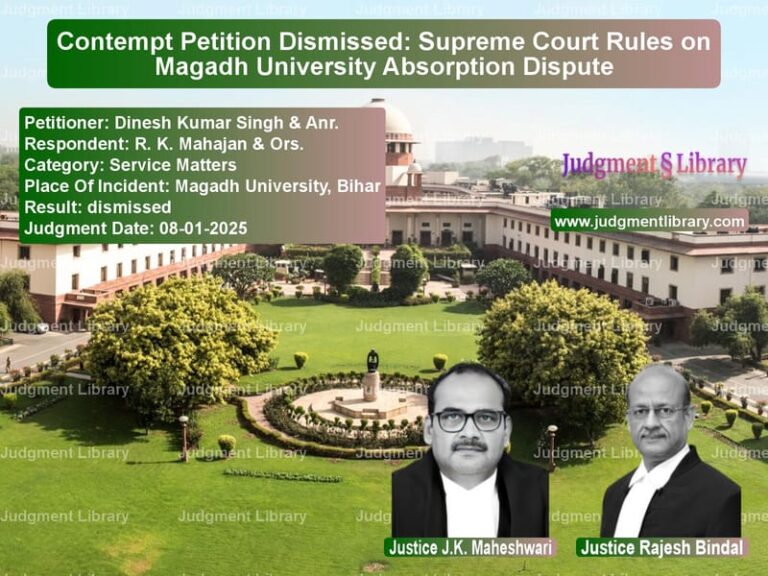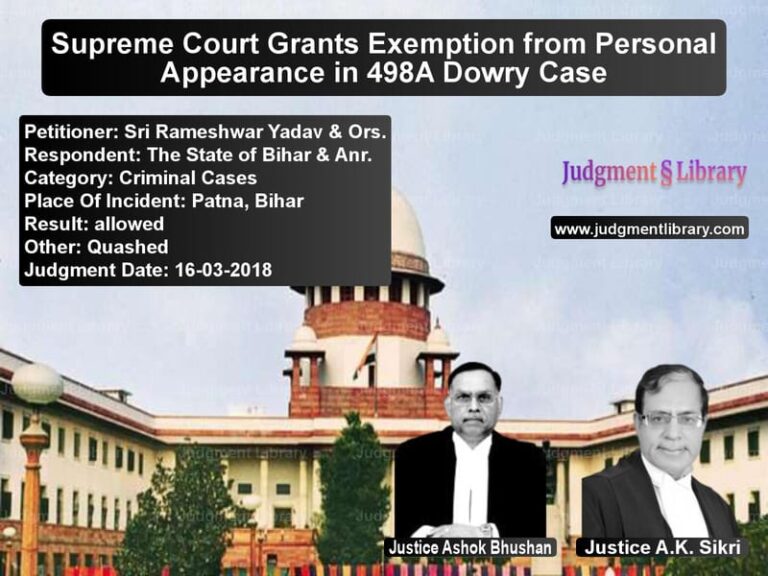Supreme Court Overturns Conviction in Gujarat Rioting Case: A Legal and Factual Analysis
In a landmark ruling, the Supreme Court of India overturned the conviction of six individuals accused of rioting and unlawful assembly in Vadod, Gujarat, during the aftermath of the 2002 Godhra riots. The case, which had been lingering for years, involved serious allegations under various sections of the Indian Penal Code (IPC), including charges of inciting communal violence, property destruction, and causing injury to law enforcement personnel.
The case originated from an incident on the night of February 28, 2002, where a large mob gathered near a graveyard and a mosque, allegedly engaging in stone-pelting and arson. The prosecution claimed that the accused were active participants in the violence and should be held accountable under IPC Sections 143, 147, 153(A), 295, 436, and 332. However, both the trial court and the Supreme Court found inconsistencies in the prosecution’s narrative, ultimately leading to an acquittal.
Background of the Case
The primary prosecution witness (PW-1), a police officer, lodged the FIR, stating that a mob had attacked a mosque and police personnel. The police responded with tear gas and gunfire, which led to the arrest of seven individuals on the spot. The prosecution argued that these arrests confirmed the accused’s involvement in the unlawful assembly.
However, the defense contended that the accused were merely bystanders caught in the chaos and that there was no concrete evidence linking them to the alleged crimes. The trial court, after analyzing witness statements and forensic evidence, acquitted all 19 accused, citing a lack of direct involvement and inconsistencies in testimonies.
High Court’s Partial Conviction
The State of Gujarat appealed the acquittal in the High Court, which upheld the trial court’s decision for accused numbers 8 to 19 but convicted accused numbers 1 to 5 and 7. The High Court reasoned that since these individuals were arrested on the spot and named in the FIR, their presence at the crime scene was sufficient to establish guilt.
The High Court observed:
“In a case of rioting, it is extremely difficult to particularize which person did what. If the presence of the accused at the crime scene is established, it is enough to presume their involvement in the unlawful assembly.”
Based on this reasoning, the High Court sentenced the accused to varied prison terms, with the maximum sentence being one year.
Supreme Court’s Verdict
The case reached the Supreme Court through an appeal, where the apex court critically examined the evidence and the rationale behind the High Court’s decision. The Supreme Court found that the High Court had erred in convicting the accused merely on the basis of their presence at the scene, without sufficient evidence to prove their active participation in the crime.
Key Arguments from the Petitioner
- The prosecution failed to provide any direct evidence linking the accused to acts of violence.
- Witness testimonies were inconsistent, and the primary witness (PW-2) was unreliable.
- No weapons or incendiary materials were recovered from the accused at the time of their arrest.
- Simply being present at the crime scene does not establish culpability under Section 149 IPC.
Key Arguments from the Respondent (State of Gujarat)
- The accused were arrested at the scene, which proves their participation in the unlawful assembly.
- In cases of large-scale rioting, it is impractical to identify each participant’s exact role.
- The police officers’ testimonies confirmed that the accused were among the rioters.
Supreme Court’s Analysis and Decision
The Supreme Court meticulously analyzed the trial records and found that the High Court had relied on weak circumstantial evidence to convict the accused. The apex court ruled:
“In cases involving large-scale riots, the courts must ensure that no innocent bystander is convicted. The prosecution must provide clear, corroborated evidence distinguishing participants from spectators.”
The Supreme Court emphasized that simply being present at the location of a riot does not automatically make a person part of an unlawful assembly. The court noted:
“Mere presence at the crime scene, without any corroborative evidence of direct involvement, is insufficient for a conviction. The prosecution’s failure to provide such evidence renders the conviction unsustainable.”
Considering these findings, the Supreme Court set aside the High Court’s order and restored the trial court’s acquittal.
Conclusion
The Supreme Court’s decision reaffirms the fundamental principle of criminal jurisprudence that an accused person must be proven guilty beyond a reasonable doubt. The ruling highlights the necessity for courts to differentiate between active participants in a crime and innocent bystanders, particularly in cases involving mass unrest and rioting.
By acquitting the accused, the Supreme Court has reinforced the principle that justice must not only be done but must also be seen to be done, ensuring that wrongful convictions do not occur based on mere assumptions.
Petitioner Name: Dhirubhai Bhailalbhai Chauhan.Respondent Name: State of Gujarat.Judgment By: Justice Pamidighantam Sri Narasimha, Justice Manoj Misra.Place Of Incident: Vadod, Gujarat.Judgment Date: 20-03-2025.
Don’t miss out on the full details! Download the complete judgment in PDF format below and gain valuable insights instantly!
Download Judgment: dhirubhai-bhailalbha-vs-state-of-gujarat-supreme-court-of-india-judgment-dated-20-03-2025.pdf
Directly Download Judgment: Directly download this Judgment
See all petitions in Bail and Anticipatory Bail
See all petitions in Attempt to Murder Cases
See all petitions in Fraud and Forgery
See all petitions in Extortion and Blackmail
See all petitions in Judgment by P.S. Narasimha
See all petitions in Judgment by Manoj Misra
See all petitions in allowed
See all petitions in supreme court of India judgments March 2025
See all petitions in 2025 judgments
See all posts in Criminal Cases Category
See all allowed petitions in Criminal Cases Category
See all Dismissed petitions in Criminal Cases Category
See all partially allowed petitions in Criminal Cases Category







